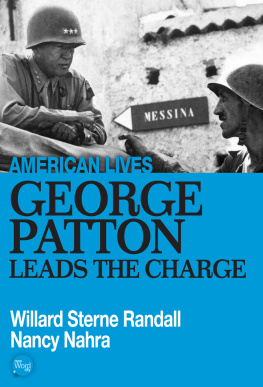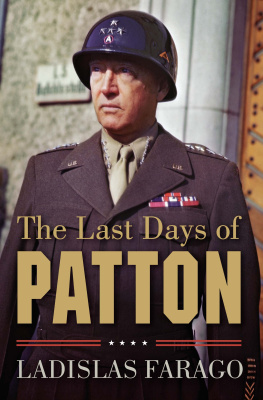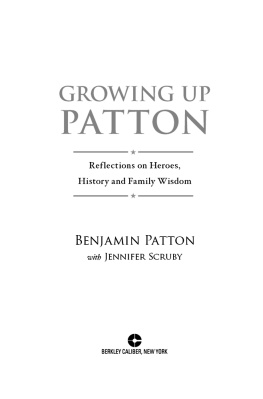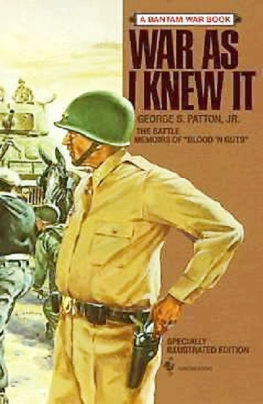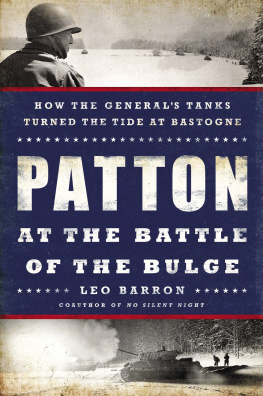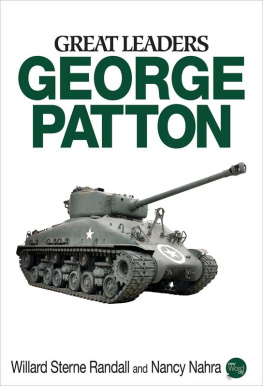Acclaim for The Patton Papers
A simply superb exposure of the Great Georgie out of his own mouth.
S.L.A. Marshall
[The Patton Papers] reveal a much more complicated character than his comicbook legend suggested.... Blumenson has done a superb job of editing Pattons diaries, letters, memos and speeches. He has skillfully stitched them together with explanatory narrative.
Time
Here is Patton in all his truculent glory.... Blumenson is extraordinarily evenhanded in his final assessment.
Christopher Lehmann-Haupt, New York Times
Blumenson brings his sharp psychological insight into the inner turmoil of George Patton.... It is Pattons often acute and unexpected humorous characterizations of men that provide the freshest perceptions in this... sympathetic and flawlessly crafted biography.
New York Times Book Review
By means of superior editing and sparing comment of his own, Blumenson has permitted George S. Patton to speak for himself through his letters and diaries, and the result is a disturbing and absorbing portrait.
Saturday Review
The only definitive work ever published on Americas most controversial military figure... The multifaceted personality of Patton comes through with a force that is rare in literary works today.
Dallas News
Blumenson has produced the first picture of Patton that is more than one dimensional. He gives insights into Pattons mind and character hitherto unknown, but, as important, also gives a clear portrait of Pattons era.... This biography is unique; there is nothing in print that so clarifies this individual or provides the wealth of data between two covers. A must.
Choice
The lavish use of Pattons letters and diaries brings the general sharply to lifean intelligent, bigoted, inquisitive, generous, witty, sensitive, spiteful man, impressive and exasperating, thoroughly right or totally wrong, but never a waffler. A great soldier who just possibly should never have been a soldier at all.
Phoebe Adams, New Yorker
A long book, but it has no dull pages... The most definitive biography of one our most remarkable fighting men.
Newsday
The excellent and judicious selection by Blumenson has given us a self-portrait of Patton that no biographer could possibly draw.... Blumenson has presented the sharpest delineation of any American general in World War II.... One could only wish that other military leaders would be so well served.
Library Journal
A masterful job.
Christian Science Monitor
THE
PATTON
PAPERS
Books by Martin Blumenson
Breakout and Pursuit
The Duel for France: 1944
Anzio: The Gamble That Failed
Kasserine Pass
Sicily: Whose Victory?
Salerno to Cassino Bloody River: The Real Tragedy of the Rapido
Eisenhower
The Patton Papers: 1885-1940
The Patton Papers: 1940-1945
The Battle of the Generals: The Untold Story of the Falaise Pocket,
the Campaign that Should Have Won War World II
Patton: The Man Behind the Legend
With James L. Stokesbury
Masters of the Art of Command
THE
PATTON
PAPERS
1940-1945
MARTIN BLUMENSON
ILLUSTRATED WITH PHOTOGRAPHS
AND WITH MAPS BY SAMUEL H. BRYANT
DA CAPO PRESS
Library of Congress Cataloging in Publication Data
Blumenson, Martin.
The Patton papers, 1940-1945 / Martin Blumenson; illustrated with photographs and with maps by Samuel H. Bryant.1st Da Capo Press ed.
p. cm.
Originally published in 1974 by Houghton Mifflin as volume 2 of The Patton papers.
Includes index.
ISBN-10: 0-306-80717-3 ISBN-13: 978-0-306-80717-6
eBook ISBN: 9780786749744
1. Patton, George S. (George Smith), 1885-1945. 2. GeneralsUnited StatesBiography. 3. World War, 1939-1945United States. 4. United States. ArmyBiography. I. Title.
E745.P3B55 1996
355.3'31'092dc20 96-15251
[B] CIP
This Da Capo Press paperback edition of The Patton Papers, 1940-1945 is an unabridged republication of the edition first published in Boston in 1974. It is reprinted by arrangement with Houghton Mifflin Company and the author.
Copyright 1974 by Martin Blumenson
Published by Da Capo Press, Inc.
A member of the Perseus Books Group
All Rights Reserved
Manufactured in the United States of America
Excerpts from Drive by Charles Codman, copyright 1957 by Theodora Duer Codman, are reprinted by permission of Little, Brown and Co., in association with The Atlantic Monthly Press. Further acknowledgments appear on page 865.
To my wife
I have come to consider myself as a sort of chip floating down a river of destiny. So far I have asked for nothing and received a great deal more than my deserts, and I believe that perhaps the same thing works in other human relations. I believe it is essential to retain your self-confidence and do your duty, and aside from that, let nature take care of itself.
George S. Patton, Jr.
Preface
W HILE THE FIRST VOLUME of The Patton Papers showed the growth of the man and the soldier, this deals with the man as a general.
During the period covered here, Patton was at his peak. He put to use all the expertise he had accumulated during a lifetime of preoccupation with his profession not only the technical knowledge of warfare in his time; but also the psychological and emotional attributes of leadership. Prepared for World War II, he attained in these years all that he ever sought. He gained victories, recognition, and applause. Yet he was never quite aware of the place he had carved for himself in history, never quite sure of the affection he had won from people everywhere. At the end he was still trying, driving himself, striving to satisfy his insatiable lust for fame.
In this volume I have attempted to follow Vincent Sheeans precept: Very often what the general does is less important than what he is. To present what Patton was as well as what he did has been my purpose. The question that frames this book is: what was the source of his military genius and how did he make it work? My broad conclusion is that the personality and the action, the word and the deed, the style and the substance were inseparable. So were the man and the military officer.
My focus is on the living human being who became a historical figure, and I have endeavored to let him speak for himself through his papers, particularly his diary. As in Mexico and in France, Patton started a notebook when he went off to war. His journal forms the heart of this book.
The reasons why anyone makes a permanent record of his thoughts and activities are, of course, diverse. In the mind of the journal-keeper must surely be an element of self-importance, a belief that his life is significant and interesting, especially to others. There must also be a sense of history and a certainty that the individual has an effect on perhaps merely reflects, but truly so his time and place. He must have a feeling of personal mission and a conviction that future generations will want to know what he did and said.
In Pattons case, he wrote or dictated his words as a nod to his own destiny, that vague but almost palpable force, like a holy grail, that he was sure led and guided him toward some great historic goal.
He also maintained a journal to amuse himself, to impress his family and close friends, and, eventually, to help his biographer understand his view and version of what happened.
Perhaps most important, the diary was his means of ridding himself of his frequent anguish, of finding comfort in moments of bitterness and discontent. It was a substitute confidant, a surrogate companion, for he sorely missed the presence of his wife who understood, supported, and stabilized him. Although he wrote to her frequently, censorship constrained his remarks. The diary allowed him to say exactly what he wished, explicitly yet privately, without compromising the public loyalty to his superiors that was one of his highest virtues.



